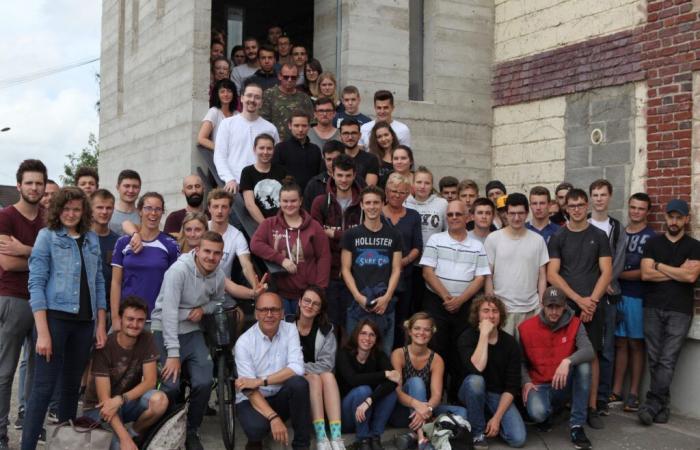The new Minister of National Education Anne Genetet officially affirmed on November 12 its desire to continue the “clash of knowledge”, announced by its predecessor, Gabriel Attalin December 2023.
Initially expected at the start of the 2024 school year, this series of reforms should revive school publishing and, in turn, the activity of successful bookstores. These brands are responsible for distributing printed textbooks, their digital versions and other educational resources to educational establishments. They often depend on public contracts, but not only, since contracts without calls for tender are concluded.
The common denominator among these bookstores is that their market is highly dependent on national education reforms. “We are in an off year, everyone is waiting for reforms and for a course of action to be given, because we lack visibility,” supports Thierry Damagnezat the head of the Cufay bookstore. His company serves nearly 2,500 communities or parent-teacher associations, including 1,500 colleges. During the last college reform in 2016, the company's turnover was around 28 to 29 million euros, or two to three times the current figure. “All subjects and levels were impacted that year. Most of the books in circulation still date from this reform, which dates back to the presidency of François Hollande. No one wants to buy back book collections with the arrival of an upcoming reform”, underlines the specialist.
To download this document, you must first purchase the corresponding item.
The same observation is made within the LDE school bookstore, which differs from its fellow successful bidders since it does not respond to calls for tenders. Its director, Frédéric Fritschhas observed a drop in purchases of paper textbooks in high schools since 2021: “If publishers are not led to produce new textbooks due to lack of reform, the question of textbook wear and tear will have to be raised. » In the industry, the typical usage life of a manual is between five and six years. “At college, the textbooks have not been renewed for almost ten years, the restocking market is not enough,” insists the founder of LDE.
To download this document, you must first purchase the corresponding item.
In this specific market, the years of reform are felt throughout the publishing world. During the last high school reform, implemented at the start of the 2019 school year, schools moved from fifth to second in value in the market (a growth of 35.9% compared to 2018). This year also marked a digital “tipping point”, according to Frédéric Fritsch.
Digital mastery
For several years, dematerialized manuals and resources have allowed these bookstores to depend less on reforms, and above all to diversify their sources of income. The digital cycle is shorter: the digital license is renewed every year, with a price of between three and seven euros. “Digital is a stabilizing segment, purchases are less important, but they take place every year. This economic model allows us to find robustness,” explains Frédéric Fritsch.
Here again, the political impulse can be felt, as the director of the eMLS bookstore indicates, Yves Morel : “When the public sphere is a driving force, it moves things forward. » The former founder of the mobile operator Bazile joined this market in 2020. Looking for a “entrepreneurship project in a noble sector”, he took over eMLS and carried out a series of commercial actions such as overhauling the visual identity and setting up a newsletter. The transition to digital is “a fundamental movement which experiences phases of acceleration and sometimes pause, but which will continue to develop and find a balance”, supports the manager.
To download this document, you must first purchase the corresponding item.
For him, this continuity can be explained, among other things, by the reduction in technical difficulties. He cites the example of the Resource Access Manager (GAR) which has facilitated access to teachers since 2017. Provided by the Ministry of National Education, this interface brings together nearly 9,000 secondary schools at the start of the 2023 school year, i.e. 97% of public establishments, and more than 23,000 schools, i.e. 51% of public schools. “This service has contributed to the deployment of digital education in France,” adds Yves Morel.
For his part, Frédéric Fritsch believes that the deployment of digital technology has mainly been supported by “the construction of a technical, educational and commercial ecosystem respectful of each of these components”. Among them, the GAR, but especially educational establishments, sector publishers, ENTs, National Education or even equipment suppliers, such as students' personal computers.
To download this document, you must first purchase the corresponding item.
An evolving profession
The deployment of digital technology requires specific skills. Bookstores that sell digital licenses provide product demonstrations and show teachers all the possibilities for using a product. A similar support model is offered by Tabuléo. From Hauts-de-France, this “school digital bookstore” launched in 2015 with the aim of simplifying the use of digital technology in establishments. The Tabuléo team provides training, often face-to-face, to teachers when the establishment takes over the project and carries out refresher sessions if necessary.
For founders Anthony Dassonville et Gael Leveneur, “without adequate support for the use of digital licenses, usage weakens.” The two men also offer the Tabuléo Connect interface, allowing establishments to access and manage all of their resources. It is mainly intended for the private sector, but communities may request a similar interface.
This is evidenced by the recent call for tenders from the Grand Est region for nearly 358 public and private high schools under contract (in 2025 and 2026), an estimated number of 1,100,000 textbooks per school year. The notice states: “The contract includes the provision of an ordering site for high schools, giving access to the entire catalog of digital resources and textbooks with an advanced search engine; the provision of licenses for digital resources and manuals and the monitoring of their delivery on the GAR of each high school; the provision of statistics as well as the establishment of a hotline interconnected to academic assistance platforms and the high school portal. »
Each time, Tabuléo applies for public markets. These latter “often take over only part of our successful bookstore activity, while we go further in support”, declare the two former general booksellers, convinced of the benefits of this format: lightening of the weight of the school bag, access to multimedia enrichment, such as videos and interactive maps, self-corrections or even feedback of notes by teachers… Supported by the digital wave, the company went from a turnover of between 2 and 3 million euros in 2019, which was a year of reform, to “soon 8 million euros” in 2024, indicate its leaders.
A mixed model
Within the eMLS bookstore, educational digital has become “predominant, while the paper textbook part is more marginal”. Quid paper? “Paper has its place depending on the audience”, supports Yves Morel. The manager highlights the criterion of ” maturity “. According to him, a student in class 6e in college must learn the culture of paper books. But a student in their final year of high school must access richer content, through the options offered by digital technology, and prepare themselves for the professional world of tomorrow. He adds: “Digital adoption depends a lot on the conditions and environment of implementation, there must be safeguards. »
In its network, the Cufay bookstore notes a stagnant demand for digital technology in college. “There is no movement of euphoria around digital technology, but rather a slight decline,” insists Thierry Damagnez. He compares the situation to Sweden, which reversed its decision to adopt an “all-digital” school model. After carrying out assessments in the sector, she noticed a drop in the general level of students. The country decides to change its policy at the start of the 2023 school year to adopt a mixed model, between printed and digital textbooks. In a similar scheme, Frédéric Fritsch would like France to carry out evaluations “before moving on to a new revolution”. An educational but also functional evaluation. Are we making it easier for teachers? Do communities get a good return on investment? Do students perform better?






